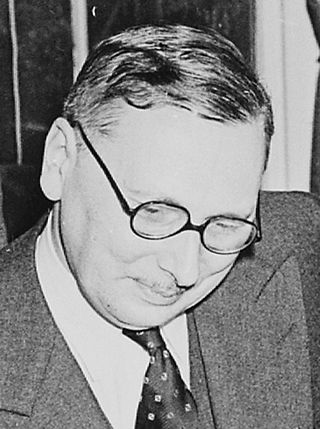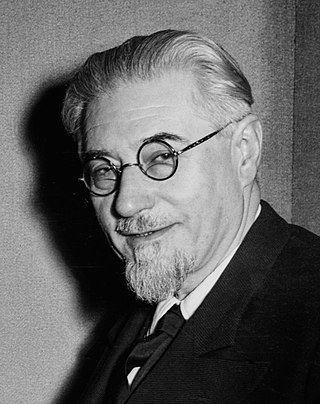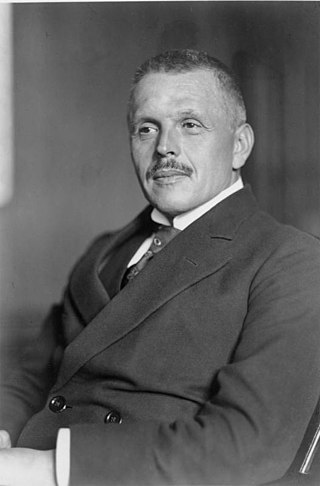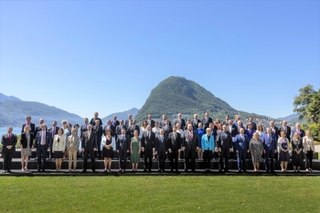
Edgar Jean Faure was a French politician, lawyer, essayist, historian and memoirist who served as Prime Minister of France in 1952 and again between 1955 and 1956. Prior to his election to the National Assembly for Jura under the Fourth Republic in 1946, he was a member of the French Committee of National Liberation (CFLN) in Algiers (1943–1944). A Radical, Faure was married to writer Lucie Meyer. In 1978, he was elected to the Académie Française.
The 2003 invasion of Iraq began on March 20. On March 18, US President George W. Bush had set a deadline for the ruler of Iraq, Saddam Hussein, and his two sons, Uday and Qusay, to leave the country or face military action. By the time of the ultimatum, political and military preparations for the invasion were well advanced.

Georges-Augustin Bidault was a French politician. During World War II, he was active in the French Resistance. After the war, he served as foreign minister and premier on several occasions. He apparently joined the Organisation armée secrète; however he always denied his involvement.

Pierre Isaac Isidore Mendès France was a French politician who served as prime minister of France for eight months from 1954 to 1955. As a member of the Radical Party, he headed a government supported by a coalition of Gaullists (RPF), moderate socialists (UDSR), Christian democrats (MRP) and liberal-conservatives (CNIP). His main priority was ending the Indochina War, which had already cost 92,000 lives, with 114,000 wounded and 28,000 captured on the French side. Public opinion polls showed that, in February 1954, only 7% of the French people wanted to continue the fight to regain Indochina out of the hands of the Communists, led by Ho Chi Minh and his Viet Minh movement. At the 1954 Geneva Conference, Mendès France negotiated a deal that gave the Viet Minh control of Vietnam north of the seventeenth parallel, and allowed him to pull out all French forces. He is considered one of the most prominent statesmen of the French Fourth Republic.
The Reconstruction Party was a Canadian political party founded by Henry Herbert Stevens, a long-time Conservative Member of Parliament (MP). Stevens served as Minister of Trade in the Arthur Meighen government of 1921, and as Minister of Trade and Commerce from 1930 to 1934 in the Depression-era government of R. B. Bennett.

René Pleven was a notable French politician of the Fourth Republic. A member of the Free French, he helped found the Democratic and Socialist Union of the Resistance (UDSR), a political party that was meant to be a successor to the wartime Resistance movement. He served as prime minister twice in the early 1950s, where his most notable contribution was the introduction of the Pleven Plan, which called for a European Defence Community between France, Italy, West Germany, and the Benelux countries.

Henri Queuille was a French Radical politician prominent in the Third and Fourth Republics. After World War II, he served three times as Prime Minister.

Paul Ramadier was a French statesman.

Félix Gouin was a French Socialist politician who was a member of the French Section of the Workers' International (SFIO).
Investment in post-2003 Iraq refers to international efforts to rebuild the infrastructure of Iraq since the Iraq War in 2003. Along with the economic reform of Iraq, international projects have been implemented to repair and upgrade Iraqi water and sewage treatment plants, electricity production, hospitals, schools, housing, and transportation systems. Much of the work has been funded by the Iraq Relief and Reconstruction Fund, and the Coalition Provisional Authority.

Otto Karl Gessler was a liberal German politician during the Weimar Republic. From 1910 until 1914, he was mayor of Regensburg and from 1913 to 1919 mayor of Nuremberg. He served in numerous Weimar cabinets, most notably as Reichswehrminister from 1920 to 1928.
The Constitution Alteration Bill 1944 was an unsuccessful proposal to alter the Australian Constitution to give the Commonwealth an additional 14 powers for a period of five years, with Prime Minister John Curtin saying that maintaining wartime controls was necessary for Australia to re-adjust to peacetime conditions. It was put to voters for approval in an Australian referendum held on 19 August 1944.

The National Reconstruction Bureau of Pakistan was an independent and constitutionally established federal institution tasked with economic recovery and prosperous development through the local government system. It was dissolved in May 2011.

Panagiotis Kanellopoulos or Panayotis Kanellopoulos was a Greek writer, politician and Prime Minister of Greece. He was the Prime Minister of Greece deposed by the Greek military junta of 1967–1974.
The Ministry of Reconstruction was a department of the United Kingdom government which existed after both World War I and World War II in order to provide for the needs of the population in the post war years.

The Landtag of Thuringia is the parliament of the German federal state of Thuringia. It convenes in Erfurt and currently consists of 90 members from six parties. According to the free state's constitution, the primary functions of the Landtag are to pass laws, elect the Minister-President and control the government of Thuringia.
The Department of Post-War Reconstruction was an Australian Government department responsible for planning and coordinating Australia's transition to a peacetime economy after World War II. The department was established in December 1942 and dissolved in March 1950.

The Greece–Bosnia and Herzegovina Friendship Building is a government office building in Sarajevo, Bosnia and Herzegovina. The building houses the Council of Ministers of Bosnia and Herzegovina. It is often erroneously referred to as the Parliament building because of its close proximity to the actual 5-story parliament building which is adjacent to the Greek–Bosnian Friendship building.
The Liberation Government was formed on 23 November 1944, when the government in exile came to Luxembourg from London and felt forced to include members of the Unio'n vun den Fraiheetsorgansatiounen, the umbrella group of the Luxembourgish Resistance which had been maintaining order since the liberation by American troops on 10 September 1944, in order to tame its critics.

Ukraine Recovery Conference (URC2022) was a two-day international conference held on 4–5 July 2022 in Lugano, Switzerland designed to present the Ukrainian roadmap on the post-war reconstruction of Ukraine, as well as to discuss plans and raise funds for the reconstruction of Ukraine. It has been called a “Marshall Plan” for Ukraine. The Cabinet of Ministers of Ukraine estimated the cost of postwar reconstruction of Ukraine at $750 billion with level of GDP growth at 7%.












